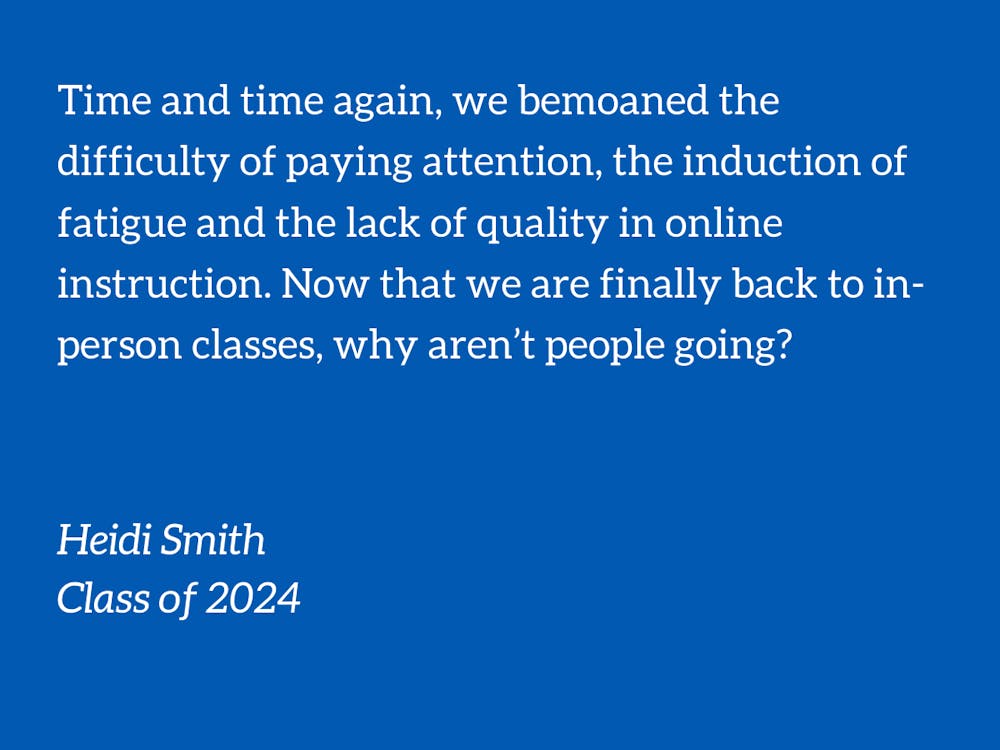If you’ve talked to a professor recently, you’ve probably heard a complaint vis-à-vis the lack of students coming to class, especially for, but not limited to, the classes for which in-person attendance is non-mandatory. The past few weeks seem to have been the perfect storm of tenting, Covid-fatigue and spring break anticipation that have led to the steady decline in class attendance.
After having about a year of mostly online classes, I thought it was rather clear that Zoom and asynchronous classes had little value, save for serving as an occasional stopgap in absence of all other options. Time and time again, we bemoaned the difficulty of paying attention, the induction of fatigue and the lack of quality in online instruction. Now that we are finally back to in-person classes, why aren’t people going?
For a student paying full-ticket—which is about half of the undergraduate population—and taking 4 classes, or around 10 sessions of class per week, the cost per class comes in at around $200 ($29,042.50 semesterly tuition/14 weeks of class/10 classes per week = $207.45 per class session). Now I know that isn’t exactly how tuition works, but, regardless, by willfully skipping a class, a student is basically saying that whatever they are doing instead is more valuable than both the monetary value of a class and the less tangible educational benefits. There are certainly circumstances that warrant the occasional missing of a class or two, such as illness (although it seems like this is no longer a reason why students choose to miss class, as evidenced by the amount of coughing and nose-blowing in my recent lectures), a one-time conflict with an interview or a personal emergency. But the extent to which students are skipping classes is more than an occasional phenomenon, and that’s not a good thing.
A big reason as to why students skip class is, if it is recorded, why should they go in-person when they can watch it at 2x speed later? This is very common in large lecture courses, with the reasoning that if students are ill, they can easily catch up later on Warpwire or Panopto or tune in via Zoom. As we continue to loosen Covid restrictions and see case numbers go down, this should be an accommodation which is exercised with caution. If a student is ill and misses a class, receiving access to a recorded version makes sense. Otherwise, lack of attendance should not be incentivized to this extent. Do the benefits of recording lectures for asynchronous viewing outweigh the costs of diminished attendance for in-person classes?
Additionally, when attendance has no tangible incentive—like a participation grade—it can be hard to always see the benefits of going to class, although studies have found correlations between attendance and class performance. As I have discussed previously, Duke students have an abundance of options for how to spend their time. In the moment, it may be easier to choose to take that nap or scroll through social media instead of going to math class, but in the long term, it will lead to more difficulty in completing coursework and grade-related emotional strife.
Further, this lack of going to class signifies a lack of respect for professors, many of whom are working very hard to engage students in the material about which they are so passionate. Perhaps if you find the majority of your classes boring, useless and unworthy of your time, then you are not in the right field of study. In one of my classes, a couple of days before spring break, several students packed up and left in the middle of class. While the professor remarked that we had “a lot of quitters” that day, I was shocked that other students would see doing that as a viable option. While I know that not every class is going to be every student’s cup of tea, I find myself wondering, where is the passion that supposedly got us all here? Is college simply yet another means to an end?
It shouldn’t be something to brag about if you are skipping class on a regular basis. I wonder whether making attendance part of every class’s final grade would be incentive enough, but I think it just comes down to personal accountability and motivation. What makes students feel like going to class is worthwhile? It isn’t the professor’s fault if you sign up for their class with no intention of being committed to learning the material. Maybe it isn’t always pleasant to go to that requirement-fulfilling lecture at 8:30 am, but avoiding discomfort isn’t going to make you a better student or, for that matter, a stronger person.
I worry that spring break may represent an insurmountable falling off point of class attendance, but I urge my fellow students to take this first week back as a fresh start. It’s never too late to get back on the wagon and put full effort into academics. It is such an incredible privilege to devote four years of our lives to studying the things we are passionate about with incredibly accomplished peers, under professors who are at the tops of their fields. To squander it away by blowing off some of the most important parts of our college experience is counterintuitive and makes me question why some students would want to come here while not taking advantage of everything college has to offer.
Heidi Smith is a Trinity sophomore. Her column runs on alternate Wednesdays.
Get The Chronicle straight to your inbox
Sign up for our weekly newsletter. Cancel at any time.

